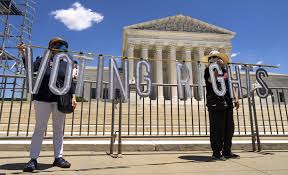Voting rights are a cornerstone of democracy, and any changes to voting laws can have profound implications. The Supreme Court’s recent ruling on a key voting rights case has sparked nationwide debate and will likely influence electoral policies for years to come. This article examines the background of the case, the Court’s decision, and what it means for the future of voting in America.
Background of the Voting Rights Case
The case in question centers on the tension between ensuring electoral integrity and protecting voter access. Over the past few years, several states have enacted laws that proponents argue prevent fraud, while critics contend they suppress voter turnout. This case brought these issues to the forefront, challenging the constitutionality of certain voting restrictions.
Details of the Case
To fully understand the significance of the Supreme Court’s ruling, we need to look at the specifics of the case.
Plaintiffs and Defendants
The plaintiffs in this case included civil rights organizations and individual voters who argued that the new voting laws disproportionately affected minority groups. The defendants were state officials who maintained that the laws were necessary to ensure fair elections.
Key Legal Issues
The central legal issues revolved around whether the voting laws in question violated the Voting Rights Act or the Constitution. Specifically, the Court examined if the restrictions imposed an undue burden on voters and if they were justified by the state’s interest in preventing electoral fraud.
Supreme Court’s Ruling
The Supreme Court’s decision was closely watched and has significant ramifications for voting rights across the country.
Majority Opinion
The majority opinion, penned by Chief Justice John Roberts, upheld the voting restrictions. The Court ruled that while the laws might impose some burdens, they did not constitute an unconstitutional infringement on voting rights. The decision emphasized the state’s authority to implement measures to protect electoral integrity.
Dissenting Opinion
The dissenting opinion, led by Justice Sonia Sotomayor, argued that the laws disproportionately impacted minority voters and effectively disenfranchised a significant portion of the electorate. The dissenters contended that the restrictions violated both the Voting Rights Act and the Equal Protection Clause of the Fourteenth Amendment.
Implications for Voters
This ruling has far-reaching consequences for voters nationwide.
Access to Voting
The decision may lead to more stringent voting laws in various states, potentially making it more difficult for some individuals to cast their ballots. This is particularly concerning for minority, elderly, and low-income voters who may face additional hurdles under these laws.
Voter Identification Laws
One of the critical aspects of the case was the requirement for voter identification. The ruling supports the enforcement of strict ID laws, which critics argue disenfranchise those who may not have easy access to identification documents.
Impact on Future Legislation
The Supreme Court’s ruling will undoubtedly influence future voting laws at both the federal and state levels.
Federal Laws
The decision may prompt Congress to revisit federal voting rights legislation, potentially leading to new laws aimed at protecting voter access while addressing concerns about electoral integrity.
State Laws
States may feel emboldened to pass more restrictive voting laws, citing the Supreme Court’s ruling as validation. This could lead to a patchwork of regulations varying significantly from state to state.
Reactions from Political Figures
Political leaders from both sides of the aisle have expressed strong opinions about the ruling.
Support
Supporters of the decision argue that it is a victory for electoral integrity and states’ rights. They believe that the ruling ensures that elections are fair and free from fraud.
Opposition
Opponents contend that the ruling undermines the Voting Rights Act and threatens to disenfranchise vulnerable populations. They argue that it sets a dangerous precedent for future voting rights cases.
Public Opinion
Public reaction to the ruling has been mixed. While some applaud the decision as a necessary step to protect the sanctity of elections, others fear it will lead to widespread voter suppression.
Comparison to Previous Voting Rights Cases
This case draws comparisons to past Supreme Court decisions on voting rights, such as Shelby County v. Holder. Unlike previous rulings that struck down key provisions of the Voting Rights Act, this decision upholds state-level voting restrictions.
Legal Experts’ Analysis
Legal analysts have offered varying interpretations of the ruling. Some view it as a balanced approach to maintaining electoral integrity, while others see it as a setback for voting rights protections.
Challenges Ahead
The Supreme Court’s ruling does not mark the end of the debate over voting rights. Numerous challenges lie ahead as lawmakers, activists, and voters navigate the implications of this decision.
Future Prospects
Looking forward, the impact of this ruling will depend on how states implement their voting laws and how Congress responds. Continued advocacy and legal challenges are likely as the nation grapples with ensuring fair and accessible elections.
The Supreme Court’s ruling on this key voting rights case represents a pivotal moment in the ongoing struggle to balance electoral integrity with voter access. As the nation moves forward, it is essential to monitor the implementation of voting laws and advocate for policies that protect the fundamental right to vote.




